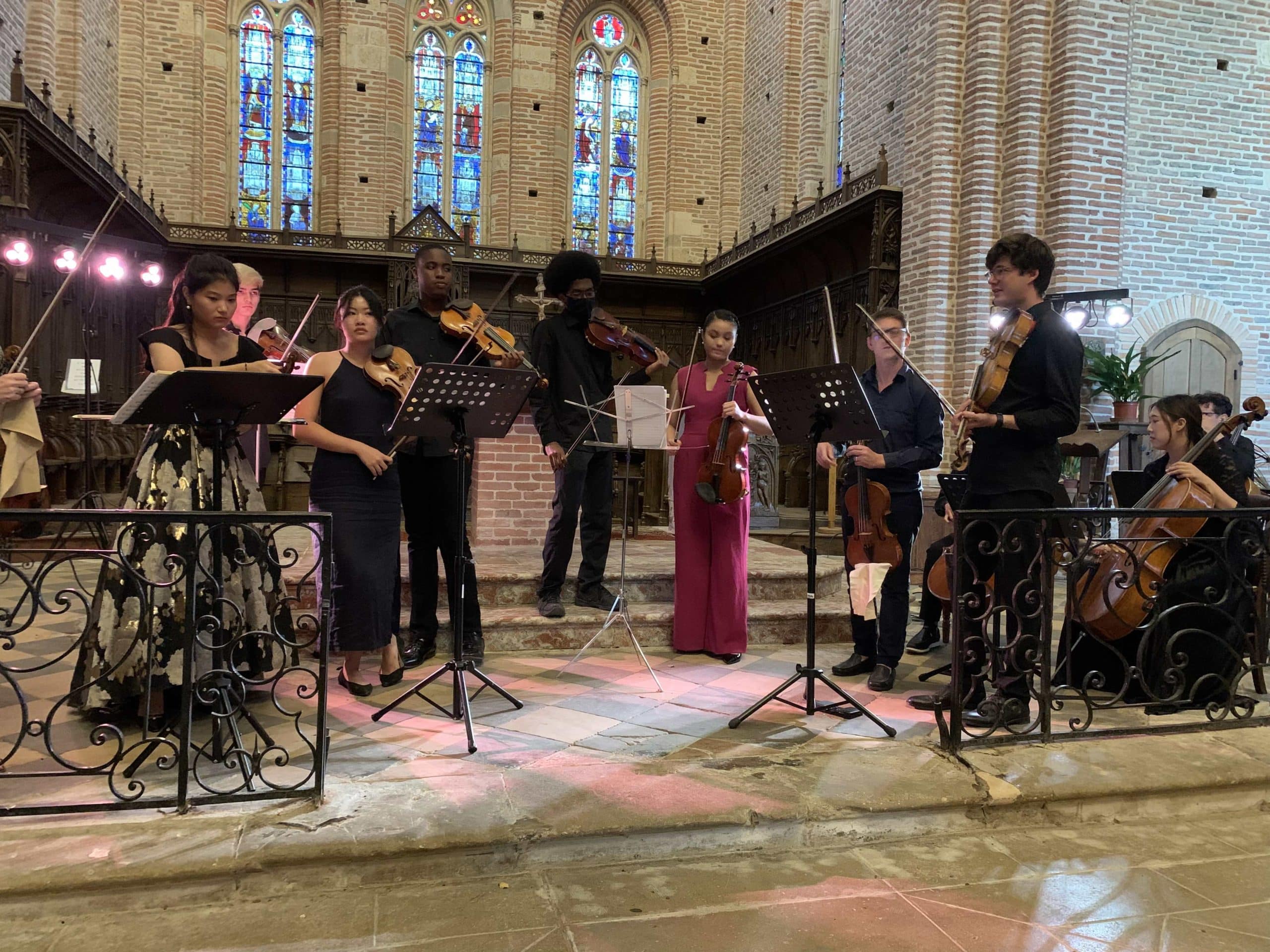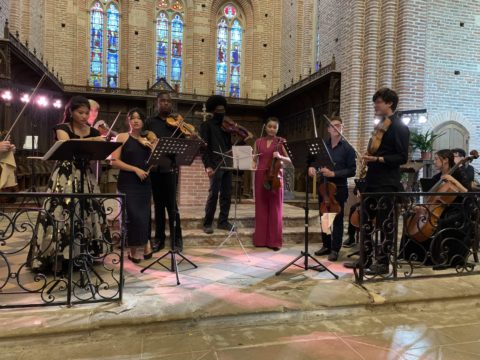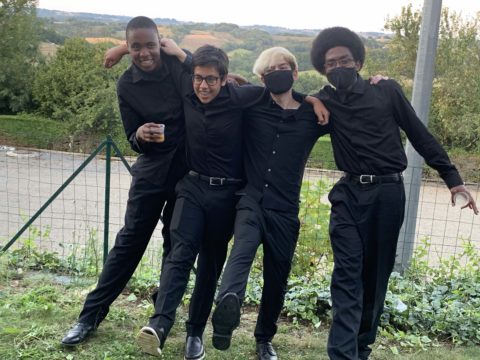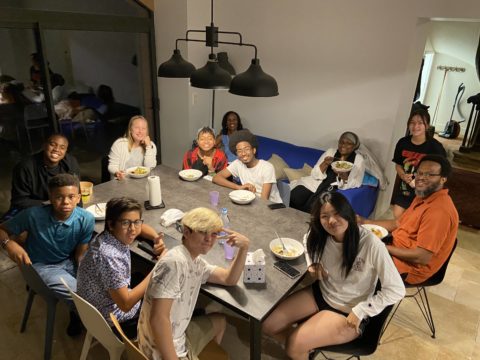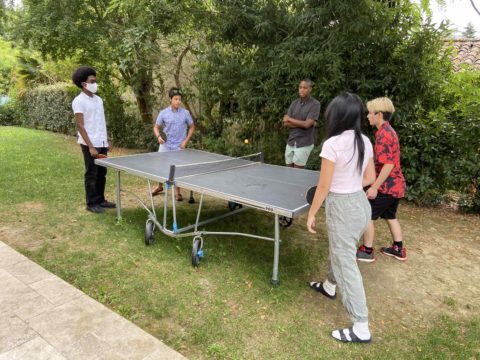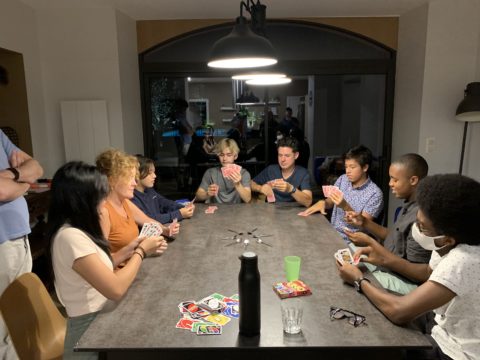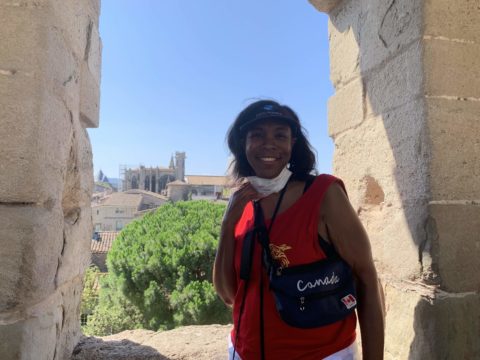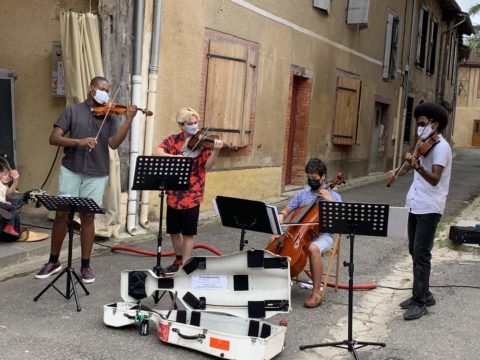CMPI Student Navigator Jennifer Woodrum recently had the privilege of sitting down with Ayesha Shahid and Angela Whitfield — two fierce CMPI moms who know an amazing opportunity when they see one for their children, CMPI violin fellows Nazeeh Shahid and Aidan Sinclair Daniels. When offered an opportunity to participate in an amazing chamber music festival with their quartet in Southern France, Musique dans le Gers, in August of 2021, they were ready! Read on to hear more about their decision-making process and the impact this experience had on them, as mothers and on their children.
What was your decision-making process like, from the time you learned about the opportunity to actually deciding that you would go?
Ayesha: We were not going to go at first, but I talked to all the people in my network. I’ll start with [violin teacher] Desirée Ruhstrat. We have developed a good relationship over Zoom working, trying to keep Nazeeh on the right path. She said, “Look, there is nobody there. It’s just the cows. I promise you.” Her group did this festival during the pandemic last year. When I talked to [CMPI Program Director] Adrienne, she said, “This is an experience that he should definitely have.” And I talked to [Merit violin teacher] Mr. Beach and he said, “I went to Europe by myself in my twenties and it completely changed me.” Then, you listened to my concerns and said, “I hear you but I don’t think he should miss out on this opportunity.”
You clearly were encouraged by Nazeeh’s support network, did you run into any resistance to going from family or close friends?
Ayesha: My husband was not on board whatsoever. His stance was, “No. This is really a pandemic. Are you serious?” I was a mess. Desirée had several meetings with the quartet to address all the questions and concerns. I had a lot of trusted guidance and relied on that to convince my husband. In the end, the compromise was we were going to go with him and be away from people as much as possible.
How about you, Angela? What was your decision-making process like, between hearing about the opportunity and deciding you would go?
Angela: The way I grew up, my parents instilled certain things in me. I thought right away that this is one of those once in a lifetime opportunities that Aidan should have. I remember when I was in high school and came home to tell my parents that for the first time ever, Loyola was offering an opportunity for high school students to take an MBA class and stay in the dorm at Loyola for several weeks over the summer. Both of them almost simultaneously said, “You’re going, aren’t you?” Of course, I went and it WAS a life-changing opportunity. The only hesitation for going to France came from not knowing if the borders would be open. Desiree told us about the opportunity in June of 2021 and the borders didn’t open until the beginning of August!
Did your travel go smoothly or were there any hiccups?
Ayesha: Everything was great at first. Everyone had plenty of legroom, which I was worried about because we are all tall. On the flight right before we landed, they announced, “There’s an Air Portugal strike.” They basically said that we could not get on the plane to go to Toulouse because all of the Air Portugal pilots were striking. As soon as we got off the plane, a very rude woman took our boarding passes and said, “Wait over there.” It was horrible. We waited and they gave us new passes on Air France and we flew Air Portugal to France and then Air France to Toulouse. In that process, they misplaced our bags and we had three days with no baggage whatsoever. Usually, we do carry-ons, but because Nazeeh had two instruments, we did not have any carry-ons. We had no toothbrushes, soap, brushes for our hair or clothing. Figuring out how to get all these things was a wonderful opportunity to work on our French. My older daughter speaks French, but she did not come with us on this trip. We Google-translated a whole lot. People in France say that they speak a little bit of English, but their “little bit” is actually quite good!
Here’s something funny. As you know, Nazeeh has a lot of hair. The hair products and the things that you need as an African American boy are not easily found in France. I just wanted to be able to find a pick. It was hilarious! We could not find a pick anywhere. We are so used to being able to walk into any store and get anything. This trip made me really see that we don’t need so much and maybe we just need to pare down when we get home.
What were the accommodations like?
Angela: Since I don’t speak the language and I was going to be by myself, I didn’t want to stay in a house where there’s nothing around me. Some places were suggested to me, but they were all booked because of the festival. I went to my travel agent to work on booking the flights and I told her I wanted to stay in Toulouse because that’s the nearest big city. She did a lot of research and in the end, we decided on a Best Western because some of the other ones were near the train station, which can be very noisy and congested. It was the perfect location because I could walk to all the restaurants and sights. Toulouse was about 45 minutes to an hour’s drive from where everyone else was staying, and at night, it was pitch dark on that road. It is very remote and there are not lights on the roads, which are very narrow. If another car approaches, you are playing chicken. One night, I stayed with Aidan because I did not want to drive on that dark narrow road. He actually had two beds in his room and his room was bigger than my hotel room. I did eventually realize that the moon is so bright there, that it does help light up the road, but not enough for my comfort!
Ayesha: I, on the other hand, didn’t want us to be near any people in the pandemic. I just wanted to be by the cows, so we rented half a farmhouse. There was nobody there and that was really good for us. And Nazeeh stayed in the gîte [French vacation house] with the rest of the quartet, the coaches, the NU quartet and the chaperones.
What was day-to-day life like for Aidan and Nazeeh?
Ayesha: They got the chance to live and work like musicians.
Angela: They got up, they got dressed, ate breakfast and started practicing. In the evenings, they would eat dinner cooked by one of the chaperones or Desirée and then play games. There was a TV somewhere in the house, but never once did it get turned on.
Ayesha: They did their individual practice right after breakfast and then they walked over to the practice area to rehearse and have coaching. Typically, in the afternoons, they would go do a performance. If they weren’t performing, they would go watch a performance. In the evenings, none of them had electronic devices. They would sit around and play card games with Desirée or play ping pong.
Did the students have a day off?
Angela: Well, they didn’t have a day off, but they had an afternoon off and we all got to go to Carcassonne to see some of the Medieval architecture. It was breathtaking.
What were the experiences that confirmed that you made the right choice in going?
Angela: There were some concerts where the audience was just so appreciative of these kids up there playing. There were some older people that were so enthusiastic and when I saw that and I felt that energy, my heart said, “Oh yes, this was so worth it.” For these young people to be able to bring such incredible joy to these people at such a different level than what I’ve ever seen in the states was incredible. Oh, and the other part of it is just the diversity of that group. When you see four diverse boys ages 13 to 17, two African American, one Hispanic and one Asian up there playing the music that they’re playing, that alone just got me. Then add on top of that the historic venues with the energy that they played with and the beautiful surroundings — I’ll never forget it.
We laughed about the fact that this was what Ayesha had recently shared with me via email. It mirrors Angela’s sentiments. (No, they did not talk to each other to coordinate their response.)
Ayesha: As far as music and the overall experience, I am so very grateful that Nazeeh had the opportunity to participate in this festival. He and his quartet put in really long hours everyday, practicing together, alone, with coaches, then performing in quaint, historic old towns, markets, and churches across the southern French countryside and all of that hard work paid off! They made beautiful music together that stirred the soul and enlivened their audiences who have missed live music as much as we have! It tickled me to see grandmas smiling and nodding as they listened, then so moved by the experience that they had to pull out their cellphones (something that seemed to be very unusual for them) and try to figure out how to record them because it was something they felt they just had to capture. I suppose visually and musically it was quite striking. Four young men of color (African American, Asian, and Hispanic) playing the likes of Shostakovich, Ravel, and Dvorak the way that they did with such passion. And after one piece would end, the two African American young men would switch to violin or viola for the next piece and play equally well. Yes, it was certainly quite striking! They gave their performances their all and the audiences imbued them with sincere gratitude and appreciation.
What long term impact do you think this trip had on Aidan and Nazeeh?
Angela: For Aidan, it was the relationship building with his quartet. I truly saw them bonding and watching out for each other. Aidan loves quartets but never felt a connection. Now he has that connection, and they all had this life-changing experience in France together. This connection never would have happened if they didn’t have the chance to all live together for a week in the same house. As a mother, it was incredible to watch him thrive in this environment with the beautiful scenery surrounding us.
Ayesha: I agree. It was the relationship building. When they got together in France, they all built this incredible relationship with each other, and it makes them play better together. These kids don’t have a lot of friends because they have to practice so much. Now they have each other and they can all laugh at each other’s weird music jokes. Also, now he sees more opportunity for music as a career. He already knew he wanted to perform violin, but now he really likes playing viola, too. He also got to talk to the Desirée’s trio about what their day is like as musicians and their experiences as professional orchestral musicians and chamber musicians. They listened to Nazeeh and answered all his questions about what being a professional musician is like. His worldview has expanded profoundly from this experience.
Thank you so much for your time. Clearly this experience was life changing for all involved. Mother to mother, I have great admiration and respect for your recognition of this incredible opportunity amidst so much uncertainty. Thank you for sharing your story.
Images
From Top: Sprezzatura Quartet, Final Performance, Eating, Playing Ping Pong, Playing Cards, Angela Sightseeing, and an Informal Performance
